Downe Surname Ancestry ResultsOur indexes 1000-1999 include entries for the spelling 'downe'. In the period you have requested, we have the following 218 records (displaying 61 to 70): Single Surname Subscription | | | Buying all 218 results of this search individually would cost £1,136.00. But you can have free access to all 218 records for a year, to view, to save and print, for £100. Save £1,036.00. More... |
These sample scans are from the original record. You will get scans of the full pages or articles where the surname you searched for has been found. Your web browser may prevent the sample windows from opening; in this case please change your browser settings to allow pop-up windows from this site. London Marriage Allegations
(1611-1660)
London, Essex and part of Hertfordshire lay within the diocese of London. In the later 17th century the individual archdeaconry courts issued marriage licences, but for this period the only surviving material is from the overarching London Consistory court. The main series of marriage allegations from the consistory court was extracted by Colonel Joseph Lemuel Chester, and the text was edited by George J. Armytage and published by the Harleian Society in 1887. A typical later entry will give date; name, address and occupation of groom; name, address and condition of his intended bride, and/or, where she is a spinster, her father's name, address and occupation. Lastly we have the name of the church where the wedding was going to take place. For the later years Colonel Chester merely picked out items that he thought were of interest, and his selections continue as late as 1828, but the bulk of the licences abstracted here are from the 17th century.DOWNE. Cost: £4.00.  | Sample scan, click to enlarge

| Middlesex Sessions
(1625-1666)
Incidents from the Middlesex Sessions Books. These are abstracts of sessional orders, minutes of criminal cases, memoranda and other entries of record taken from the volumes of Gaol Delivery Register, Books and Rolls, Sessions of Peace Register, and Process Books of Indictments for the county of Middlesex from the death of king James I to the Great Fire of London. The references at the end of each item indicate the volume in question, the abbreviations being G. D. for Gaol Delivery, S. P. for Sessions of Peace, and S. O. T. for Session of Oyer and Terminer; occasionally preceded by S. for Special or G. for general, or followed by R. for Roll or Reg. for Register. It should be noted that, in the case of 'true bills' or indictments, the abstract starts with the date on which the offence took place, the date of the conviction &c. being at the end of the entry. These abstracts, prepared by John Cordy Jeaffreson for the Middlesex County Record Society, are far from being a complete calendar of these extensive records; his purpose was, in part, to notice 'every parchment that should exhibit a famous person's name or any other feature of personal interest'.DOWNE. Cost: £4.00.  | Sample scan, click to enlarge
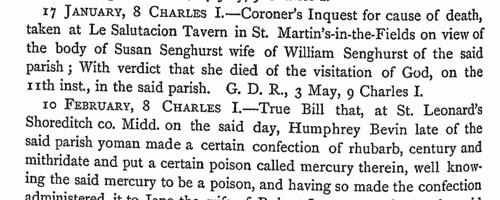
| Allegations for marriages in southern England
(1669-1679)
The province or archbishopric of Canterbury covered all England and Wales except for the northern counties in the four dioceses of the archbishopric of York (York, Durham, Chester and Carlisle). Marriage licences were generally issued by the local dioceses, but above them was the jurisdiction of the archbishop, exercised through his vicar-general. Where the prospective bride and groom were from different dioceses it would be expected that they obtain a licence from the archbishop; in practice, the archbishop residing at Lambeth, and the actual offices of the province being in London, which was itself split into myriad ecclesiastical jurisdictions, and spilled into adjoining dioceses, this facility was particularly resorted to by couples from London and the home counties, although there are quite a few entries referring to parties from further afield. The abstracts of the allegations given here usually state name, address (street in London, or parish), age, and condition of bride and groom; and sometimes the name, address and occupation of the friend or relative filing the occupation. Where parental consent was necessary, a mother's or father's name may be given. The ages shown should be treated with caution; ages above 21 tended to be reduced, doubtless for cosmetic reasons; ages under 21 tended to be increased, particularly to avoid requiring parental consent; a simple statement 'aged 21' may merely mean 'of full age' and indicate any age from 21 upwards. These are merely allegations to obtain licences; although nearly all will have resulted in the issuing of the licence, many licences did not then result in marriage. DOWNE. Cost: £4.00.  | Sample scan, click to enlarge

| Official Papers
(1660-1681)
The State Papers Domestic cover all manner of business relating to Britain, Ireland and the colonies, conducted in the office of the Secretary of State as well as other miscellaneous records. DOWNE. Cost: £4.00.  | Sample scan, click to enlarge

| Boys entering Sherborne School
(1686)
The grammar school at Sherborne in Dorset, which doubtless existed from the creation of the diocese of Sherborne in 705, was refounded by king Edward VI in 1550. At the quatercentenary in 1950, a fourth edition of the Sherborne Register was published, listing boys entering the school during those four centuries. In truth, the materials for this register survive but fitfully before 1823; for some years, no names are known; sometimes all that is known is a surname. But from 1823 onwards the lists and the details get steadily more comprehensive. By the 20th century the boys are listed alphabetically by surname under term of entrance. Surname is given in bold, then christian names, name of father (surname and initials) and address; year of birth; house (a, School House; b, Abbey House; c, The Green; d, Harper House (formerly The Retreat); f, Abbeylands; g, Lyon House; h, Westcott House); whether represented the school at cricket (xi), football (xv), shooting (viii), &c.; year of leaving; summary of degrees, career &c.; and (in italics), address as of 1950. Names in the early lists marked with an asterisk are found inscribed on the oak panelling or on the stone walls of the former schoolroom. (F) in the lists indicates a foundationer, receiving free education: after 1827, when this privilege was restricted to boys from Sherborne and neighbourhood, nearly all foundationers were day-boys.DOWNE. Cost: £4.00.  | Sample scan, click to enlarge
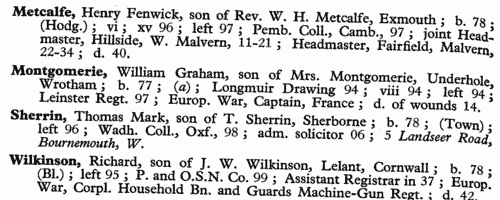
| Treasury and Customs Records
(1685-1688)
Government accounts, with details of income and expenditure in Britain, America and the colonies
DOWNE. Cost: £4.00.  | Sample scan, click to enlarge
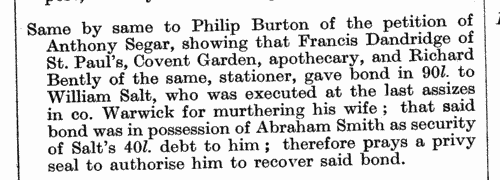
| House of Lords Proceedings
(1690-1691)
Private bills dealing with divorce, disputed and entailed estates: petitions, reports and commissions: naturalisation proceedings.
DOWNE. Cost: £4.00.  | Sample scan, click to enlarge
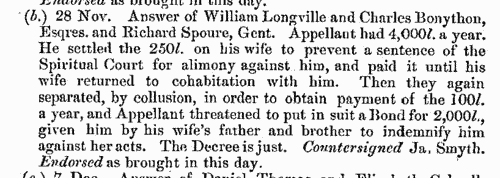
| Massachusetts Criminals, Litigants, Lawyers and Jurors
(1673-1692)
The only surviving complete volume of the records of the courts held by the Governor and Assistants of the Colony of the Massachusetts Bay is for the period 1673 to 1692. It was transcribed by John Noble, and published by order of the Board of Aldermen of the City of Boston, New England, as County Commissioners of the County of Suffolk, Massachusetts. Under English law overseas colonies were generally deemed to fall under the jurisdiction of the Admiralty, and were subject to English law varied by local circumstances. These Courts of Assistants therefore also function as Courts of Admiralty; the courts had jurisiction over criminal cases and also in civil disputes between parties. In practice, many of the names that occur in the record are just those of the members of the grand jury and the lesser juries (appointed from among the adult male householders of the colony) before whom the cases were tried.DOWNE. Cost: £4.00.  | Sample scan, click to enlarge
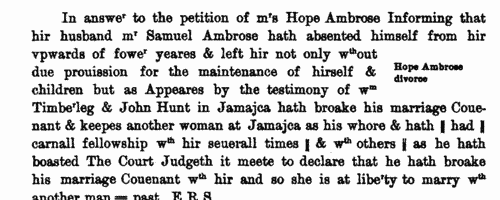
| Allegations for marriages in southern England
(1687-1694)
The province or archbishopric of Canterbury covered all England and Wales except for the northern counties in the four dioceses of the archbishopric of York (York, Durham, Chester and Carlisle). Marriage licences were generally issued by the local dioceses, but above them was the jurisdiction of the archbishop, exercised through his vicar-general. Where the prospective bride and groom were from different dioceses it would be expected that they obtain a licence from the archbishop; in practice, the archbishop residing at Lambeth, and the actual offices of the province being in London, which was itself split into myriad ecclesiastical jurisdictions, and spilled into adjoining dioceses, this facility was particularly resorted to by couples from London and the home counties, although there are quite a few entries referring to parties from further afield. The abstracts of the allegations given here usually state name, address (street in London, or parish), age, and condition of bride and groom; and sometimes the name, address and occupation of the friend or relative filing the allegation. Where parental consent was necessary, a mother's or father's name may be given. The ages shown should be treated with caution; ages above 21 tended to be reduced, doubtless for cosmetic reasons; ages under 21 tended to be increased, particularly to avoid requiring parental consent; a simple statement 'aged 21' may merely mean 'of full age' and indicate any age from 21 upwards. These are merely allegations to obtain licences; although nearly all will have resulted in the issuing of the licence, many licences did not then result in marriage. DOWNE. Cost: £4.00.  | Sample scan, click to enlarge

| Boys at Eton
(1441-1698)
King Henry VI founded a college at Eton in Buckinghamshire in 1440, 'to the praise, glory and honour of the Crucified, the exaltation of the most glorious Virgin His mother, and the establishing of holy Church His bride'. From this foundation has evolved the modern public school. Sir Wasey Sterry compiled a register for the college from 1441 to 1698, from a variety of surviving records, and including groundwork from his 'A List of Eton Commensals' of 1904, and R. A. Austen-Leigh's 'A List of Eton Collegers' of 1905. This resulting 'Eton College Register' was published in 1943. Because of the variety of underlying materials, the entries vary greatly in depth: some names survive only as a surname of not too certain date. In the fullest entries, the surname (often with a variant spelling) is given first, in bold, followed by the years of entry and leaving. The christian name is given next; then birthplace, and name of father. The initials K. S. (King's Scholar) indicate a scholar on the foundation. There will then follow a summary of the man's career, death, burial and probate; and the sources for the information, in italics, at the end of the entry.DOWNE. Cost: £4.00.  | Sample scan, click to enlarge

|
Research your ancestry, family history, genealogy and one-name study by direct access to original records and archives indexed by surname.
|












